Author Archive for Paul Eccleston
The movie that changed the way people think about what’s on their dinner plate makes its TV debut tonight – Tuesday October 20.
The End of the Line film was being screened by More4 at 10.00pm and is the latest stage of its incredible journey.
Among its many other milestones is an unprecedented four week run in London’s West End, a screening at the Sundance Festival and dozens of special screenings at subsequent festivals.
There have also been special screenings for European royalty including Prince Albert of Monaco and the Queen of Spain.
It was on screen as the UK’s first online seafood restaurant guide www.fish2fork.com was launched this week with the backing of some VIP supporters.
Sarah Brown, the Prime Minister’s wife, said on Twitter: “The End of the Line, the brilliant, watchable film on fish is on More4 at 10.00pm tonight and sustainable fish restaurant guide www.fish2fork.com”.
There was a similar message from author, actor and green activist Stephen Fry, who urged his 870,000-strong army of followers to watch the film and to visit the website.
Fish2fork.com aims to rate restaurants not just on the usual criteria of how good their seafood is but perhaps, more importantly, on what impact its capture has on our oceans and marine life.
The online guide has been set up by the same team which turned Charles Clover’s book The End of the Line on over fishing into a hugely powerful film.
Visitors to the site will find information about seafood restaurants across the UK and will be encouraged to ask questions about the fish they are offered when they dine out.
They can then easily upload their own view of the restaurant’s commitment to sustainability onto the website and help give it a simple rating score - blue fish for good and red fish for bad – on a sliding scale.
For its launch the website has reviewed and rated more than 100 restaurants across the UK but is relying on diners to provide their own reviews and help the website grow into an authoritative reference guide.
Within hours of its launch the website was being contacted by fish lovers eager to get involved by nominating restaurants they want to see in the guide.
Fish restaurants were also quick to see the marketing possibilities of being featured on the site and had filled in the www.fish2fork.com questionnaire.

A powerful new consortium has been formed to help protect threatened tuna in the Eastern Tropical Pacific.
The International Seafood Sustainability Foundation (ISSF), made up of conservation groups, scientist and tuna industry workers immediately demanded better protection of dwindling tuna stocks.
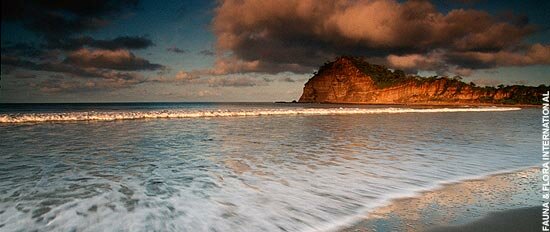
The International Seafood Sustainability Foundation, formed to protect threatened tuna in the Eastern Tropical Pacific, has attacked the Inter-American Tropical Tuna Commission ahead of their latest meeting
And they launched a scathing attack on the Inter-American Tropical Tuna Commission (IATTC) for ignoring scientific advice about overfishing and the damage being done to other species such as dolphins, turtles, sharks and seabirds.
The new pressure group claimed that IATTC, made up of 16 member countries with a mandate to regulate fishing fleets to avoid over-exploitation of tuna in the Eastern Pacific, had held six meetings in the past two years but had failed to take a single decision to help the threatened fish. Continue reading ‘New consortium aims to protect threatened tuna species’

Environmental protection groups have launched an 11th hour bid to get better legal protection for marine life around Britain’s shores.
They will be protesting in Westminster today as the new Marine and Coastal Access Bill completes its passage through Parliament.
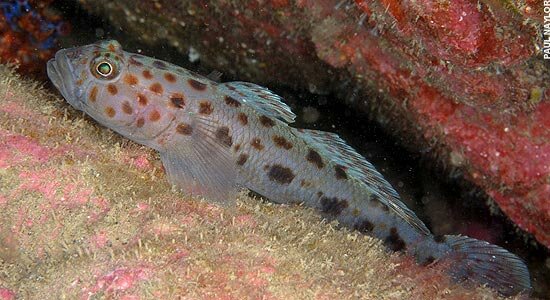
Leopard spot goby in waters off the British coast
The groups say it will be the last chance to insert tougher measures into the Bill which will guarantee protection for the most important areas in the marine environment.
The RSPB, The Wildlife Trusts, the Marine Conservation Society and WWF have been campaigning for comprehensive legislation for almost a decade.
They claim the current proposals are too weak and won’t prevent the steady decline of many marine species and habitats in UK waters due to over fishing and industrialisation. Continue reading ‘Marine Bill: Environment groups launch 11th hour bid for better protection’

The humble sea cucumber is under increasing threat worldwide, a new report warns.
- Sea cucumbers: a global review of fisheries and trade - UN FAO report
- UN FAO
Increasing demand for the cucumber – once a cheap and staple food of the poor, but now fashionable in expensive restaurants – is piling pressure on already depleted stocks.
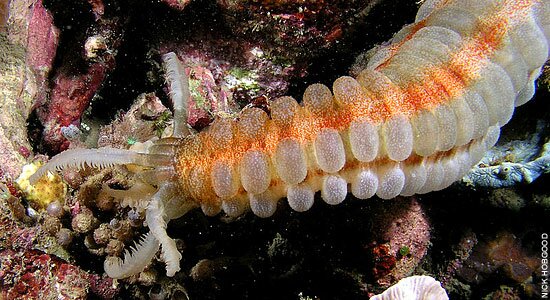
Sea cucumber feeding at night off the Indonesian coast
The UN’s Food and Agriculture Organisation (FAO) warns in its report that sea cucumber populations across the globe, from Asia to the Galapagos, are in trouble and most high value commercial species are already depleted.
In a majority of countries looked at by the FAO and in the African and Indian Ocean regions, stocks are overfished. Similarly, in the Asian Pacific region the most sought-after species are largely depleted. Continue reading ‘UN report: Sea cucumbers face overfishing threat’

Government plans for ‘protection zones’ around the UK coastline are inadequate and won’t halt the dramatic decline of marine species, according to environment groups.
- WWF: New marine proposals are “a drop in the ocean”
They have warned that much tougher legislation and more ambitious marine protection zones are needed to help preserve sea life.
The EU has ordered member states to set up special zones under its Marine Strategy Directive, in a bid to halt the slide in biodiversity caused by overfishing and industrialisation.
The first UK offshore sites are due to be announced soon but critics say they fall far short of Government promises to set up a network of marine reserves where stocks would be safeguarded against overfishing. Continue reading ‘Environment groups say UK marine protection zone plans are inadequate’

Most deep sea fisheries are unsustainable and should be closed, a new report says.
The call comes after a 25-year-long marine study revealed that commercial fishing in the north-east Atlantic could be damaging species at much greater depths than previously believed.
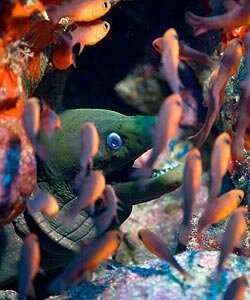
Moray eel - the study found numbers of one species of eel were down by half
Numbers of deep-water species living a kilometre below the reach of trawlers are apparently being affected by fishing practices, the new study found.
Although scientists have known that commercial fishing does affect deep-water fish populations they have now discovered it is occuring at much greater depths.
Populations of north-east Atlantic commercial deep-water fish such as black scabbardfish, orange roughy and roundnose grenadier have dwindled since deep-water fishing started in the area in the late 1980s but a quota system wasn’t introduced until 2003.
Dr David Bailey of the University of Glasgow, who led the study, published in the journal Proceedings of the Royal Society B, said:
“Commercial fishing may have wider effects than anyone previously thought, affecting fish which we assumed were safely beyond the range of fishing boats. We were extremely surprised by this result and believe that it has important implications for how we manage the oceans.”
Deep-water fish living off the west coast of Ireland were monitored by Natural Environment Research Council-owned ships from 1977 until 1989 before any fishery was operating in the region.
Researchers checked the same area again from 1997 until 2002 using exactly the same methods and the results were then compared as part of an EU-led project to study deep-sea species. Continue reading ‘Deep sea fish suffer far greater damage than was first thought’

Nearly half of all fish produced for food is now farmed rather than caught in the wild, a new UN report reveals.
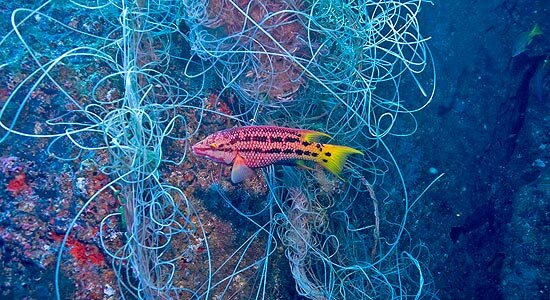
The biennial State of World Fisheries and Aquaculture (Sofia) report shows that stocks continue to be depleted by overfishing
The amount of fish produced by farming rose in the past two years while the number of wild fish stocks ranked as over-fished, depleted or fully exploited increased to 80 per cent of the world’s stocks.
The figures released in Rome by the United Nations Food and Agriculture Organisation (FAO) indicate that the amount of fish caught at sea has reached a plateau and may be in decline when suspected over-reporting by China is taken into account.
On the other hand, the amount of fish raised by aquaculture rose to 47 per cent of all produced for food. Continue reading ‘Farmed fish set to overtake wild caught fish for first time’

Fish must be exploited less heavily if they are to adapt to climate change, according to the UN Food and Agriculture Organisation.
Responsible fishing practices need to be more widely adopted to tackle over-fishing and fishery management plans should include strategies for coping with rising sea temperatures.
“Best practices that are already on the books but not always implemented offer clear, established tools towards making fisheries more resilient to climate change,” said Kevern Cochrane, one of the authors of The State of World Fisheries and Aquaculture (Sofia), 2009.
“So the message to fishers and fisheries authorities is clear: get in line with current best practices, like those contained in FAO’s Code of Conduct for Responsible Fisheries, and you’ve already taken important strides towards mitigating the effects of climate change.”
Climate change is already altering the distribution of both marine and freshwater species with warmer-water species being pushed towards the poles and experiencing changes in habitat size and productivity, the report says.
It is also affecting the seasonality of biological processes and altering marine and freshwater food sources which has unpredictable consequences for fish production.
A decrease or loss of locally available fish stocks will pose serious problems for communities which depend on abundant supplies for their livelihood.
“Many fisheries are being exploited at the top range of their productive capacity. When you look at the impacts that climate change might have on ocean ecosystems, that raises concerns as to how they’ll hold up,” said Cochrane.
Vulnerable communities who rely on their fishing and aquaculture industries need to take urgent action to strengthen their resilience to climate change, the report urges.
The authors of the report say that fisheries and aquaculture make a minor but significant contribution to greenhouse gas emissions during fishing operations and the transport, processing and storage of fish.
The average ratio of fuel to carbon dioxide (CO2) emissions for capture fisheries is estimated at about 3 teragrams of CO2 per 1m tonnes of fuel used.
“That could be improved. Good fisheries management can substantially improve fuel efficiency for the sector,” Cochrane said.
“Overcapacity and excess fishing capacity mean fewer fish caught per vessel - that is, lower fuel efficiency - while competition for limited resources means fishers are always looking to increase engine power, which also lowers efficiency.”
Much of the industry’s carbon footprint comes in the transport of the fish, particularly by air, once they have been harvested.
Intercontinental airfreight emits 8.5 kg of CO2 per kilogram of fish transported. This is about 3.5 times that for sea freight and more than 90 times that from local transportation of fish where it is consumed within 400 kilometres of catch.

![]()







